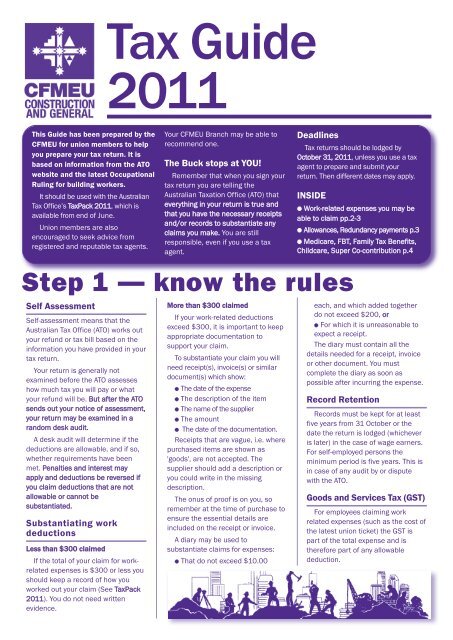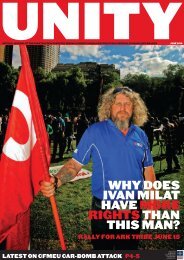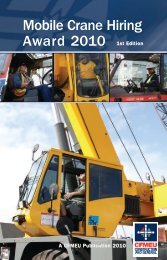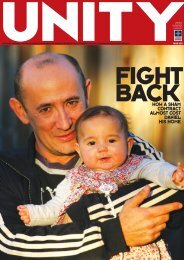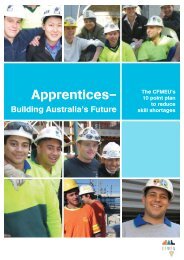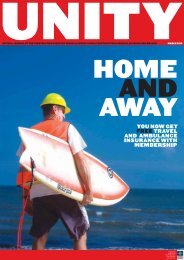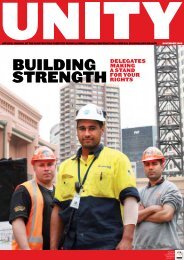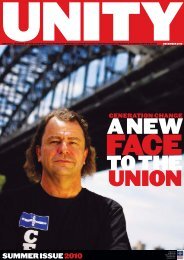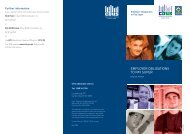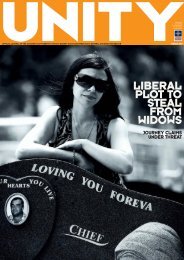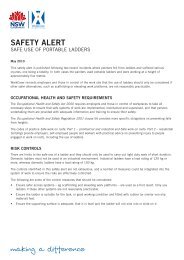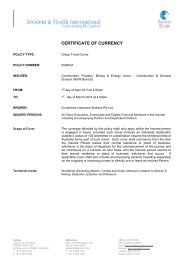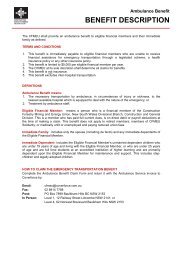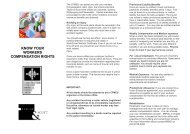Tax Guide 2011 - cfmeu
Tax Guide 2011 - cfmeu
Tax Guide 2011 - cfmeu
You also want an ePaper? Increase the reach of your titles
YUMPU automatically turns print PDFs into web optimized ePapers that Google loves.
This <strong>Guide</strong> has been prepared by the<br />
CFMEU for union members to help<br />
you prepare your tax return. It is<br />
based on information from the ATO<br />
website and the latest Occupational<br />
Ruling for building workers.<br />
It should be used with the Australian<br />
<strong>Tax</strong> Office’s <strong>Tax</strong>Pack <strong>2011</strong>, which is<br />
available from end of June.<br />
Union members are also<br />
encouraged to seek advice from<br />
registered and reputable tax agents.<br />
Self Assessment<br />
Self-assessment means that the<br />
Australian <strong>Tax</strong> Office (ATO) works out<br />
your refund or tax bill based on the<br />
information you have provided in your<br />
tax return.<br />
Your return is generally not<br />
examined before the ATO assesses<br />
how much tax you will pay or what<br />
your refund will be. But after the ATO<br />
sends out your notice of assessment,<br />
your return may be examined in a<br />
random desk audit.<br />
A desk audit will determine if the<br />
deductions are allowable, and if so,<br />
whether requirements have been<br />
met. Penalties and interest may<br />
apply and deductions be reversed if<br />
you claim deductions that are not<br />
allowable or cannot be<br />
substantiated.<br />
Substantiating work<br />
deductions<br />
Less than $300 claimed<br />
If the total of your claim for workrelated<br />
expenses is $300 or less you<br />
should keep a record of how you<br />
worked out your claim (See <strong>Tax</strong>Pack<br />
<strong>2011</strong>). You do not need written<br />
evidence.<br />
<strong>Tax</strong> <strong>Guide</strong><br />
<strong>2011</strong><br />
Your CFMEU Branch may be able to<br />
recommend one.<br />
The Buck stops at YOU!<br />
Remember that when you sign your<br />
tax return you are telling the<br />
Australian <strong>Tax</strong>ation Office (ATO) that<br />
everything in your return is true and<br />
that you have the necessary receipts<br />
and/or records to substantiate any<br />
claims you make. You are still<br />
responsible, even if you use a tax<br />
agent.<br />
Step 1 — know the rules<br />
More than $300 claimed<br />
If your work-related deductions<br />
exceed $300, it is important to keep<br />
appropriate documentation to<br />
support your claim.<br />
To substantiate your claim you will<br />
need receipt(s), invoice(s) or similar<br />
document(s) which show:<br />
● The date of the expense<br />
● The description of the item<br />
● The name of the supplier<br />
● The amount<br />
● The date of the documentation.<br />
Receipts that are vague, i.e. where<br />
purchased items are shown as<br />
'goods', are not accepted. The<br />
supplier should add a description or<br />
you could write in the missing<br />
description.<br />
The onus of proof is on you, so<br />
remember at the time of purchase to<br />
ensure the essential details are<br />
included on the receipt or invoice.<br />
A diary may be used to<br />
substantiate claims for expenses:<br />
● That do not exceed $10.00<br />
Deadlines<br />
<strong>Tax</strong> returns should be lodged by<br />
October 31, <strong>2011</strong>, unless you use a tax<br />
agent to prepare and submit your<br />
return. Then different dates may apply.<br />
INSIDE<br />
● Work-related expenses you may be<br />
able to claim pp.2-3<br />
● Allowances, Redundancy payments p.3<br />
● Medicare, FBT, Family <strong>Tax</strong> Benefits,<br />
Childcare, Super Co-contribution p.4<br />
each, and which added together<br />
do not exceed $200, or<br />
● For which it is unreasonable to<br />
expect a receipt.<br />
The diary must contain all the<br />
details needed for a receipt, invoice<br />
or other document. You must<br />
complete the diary as soon as<br />
possible after incurring the expense.<br />
Record Retention<br />
Records must be kept for at least<br />
five years from 31 October or the<br />
date the return is lodged (whichever<br />
is later) in the case of wage earners.<br />
For self-employed persons the<br />
minimum period is five years. This is<br />
in case of any audit by or dispute<br />
with the ATO.<br />
Goods and Services <strong>Tax</strong> (GST)<br />
For employees claiming work<br />
related expenses (such as the cost of<br />
the latest union ticket) the GST is<br />
part of the total expense and is<br />
therefore part of any allowable<br />
deduction.
More rules<br />
Allowances<br />
You may be able to claim an<br />
allowance as a deduction if the<br />
amount of your allowance has been<br />
included in your income.<br />
If allowances are shown as<br />
separate amounts on your pay slip,<br />
then they must be shown as income<br />
on your tax return.<br />
Simply receiving an allowance<br />
You may be able to claim<br />
some or all of the<br />
following expenses in<br />
your tax return:<br />
Fees, licences, insurance<br />
Union fees including arrears.<br />
The cost of renewing your licences<br />
and certificates that relate to your<br />
work — but not your drivers licence.<br />
You cannot claim the cost of<br />
obtaining your initial licence or<br />
certificate.<br />
The cost of sickness and<br />
accidental insurance premiums that<br />
relate to your work.<br />
Work clothes<br />
The cost of buying, renting,<br />
repairing and cleaning a compulsory<br />
uniform (a compulsory uniform is a<br />
set of clothing that, worn together,<br />
identifies you as an employee of an<br />
organisation having a strictly<br />
enforced policy that makes it<br />
compulsory for you to wear the<br />
uniform while at work), or a single<br />
item of compulsory clothing (usually<br />
clothing with the employer’s logo<br />
permanently attached).<br />
The cost of buying, hiring,<br />
replacing or maintaining protective<br />
CFMEU <strong>Tax</strong> <strong>Guide</strong> <strong>2011</strong> page 2<br />
does not automatically entitle you to<br />
a deduction. Generally you can only<br />
claim a deduction if the allowance<br />
has been spent in gaining your<br />
assessable income and you can<br />
substantiate your claim.<br />
See <strong>Tax</strong>Pack <strong>2011</strong> for more info.<br />
Reimbursements<br />
Generally, a reimbursement is not<br />
included as part of your income, so<br />
Work related expenses<br />
clothing (such as steel capped boots<br />
or wet weather gear worn when using<br />
chemicals or high pressure water<br />
hoses) and the cost of laundering<br />
protective clothing.<br />
Cars<br />
Car expenses (including<br />
automobile club annual road service<br />
fee and car wash expenses if you use<br />
the log book method or one third of<br />
actual expenses method).<br />
The expense of using your car for<br />
work purposes may be claimed as a<br />
deduction in any of the following<br />
circumstances:<br />
● Transporting bulky tools and<br />
equipment between home and<br />
work if there is no secure area<br />
at work to store them;<br />
● Direct travel between one<br />
place of work to another.<br />
There are four different ways to<br />
work out your claims for car<br />
expenses:<br />
● Set rate per kilometre (with a<br />
maximum of 5,000 kms), or<br />
● Actual motor vehicle expenses<br />
in accordance with a log book<br />
that indicates the percentage of<br />
work related usage, or<br />
● One third actual motor vehicle<br />
expenses (where work travel<br />
exceeds 5,000kms), or<br />
you cannot claim a deduction for this<br />
amount. There are different rules for<br />
car expenses, however. See under ‘car<br />
expenses’ and read <strong>Tax</strong>Pack <strong>2011</strong>.<br />
Claim within financial year<br />
2010-<strong>2011</strong><br />
Any claim you make for a<br />
deduction must be for an expense<br />
incurred in this financial year, that is<br />
1 July 2010 to 30 June <strong>2011</strong>.<br />
WARNING! This year the ATO is targeting the <strong>Tax</strong> Returns of construction<br />
workers, particularly in regards to claims for car expenses, travel expenses<br />
and mobile phones. Make sure you have read this section carefully before you<br />
complete your return.<br />
● 12% of the purchase cost of<br />
the motor vehicle (where work<br />
travel exceeds 5,000kms).<br />
Transport allowance/fares<br />
The full amount of these<br />
allowances will be treated as<br />
assessable income and must be<br />
shown in the allowances section of<br />
your tax return. A deduction will only<br />
be allowed if transport expenses are<br />
incurred in limited circumstances.<br />
These are:<br />
● you have to carry bulky tools<br />
and equipment to work and<br />
there is no secure area at work<br />
to store them; or<br />
● your job is itinerant, i.e. you<br />
travel to multiple job sites each<br />
day; or<br />
● your home is your base of<br />
operations i.e. you start work at<br />
home each day before traveling<br />
to a worksite to continue work.<br />
This will not apply to many building<br />
workers.<br />
If you are eligible to claim you will<br />
need to substantiate the whole of your<br />
claim where the amount claimed<br />
exceeds the amount payable under<br />
the Award as at 29 October 1986<br />
($7.60 per day).<br />
The cost of parking fees, bridge<br />
and road tolls if the travel was for<br />
work – e.g. between work sites. You
Work related expenses<br />
cannot claim a deduction for these<br />
costs for travel to and from work.<br />
Phones<br />
The work related part of the rental<br />
cost or depreciation on the purchase<br />
cost (but not the connection fee) of<br />
answering machines, mobile phones,<br />
pagers and other telecommunications<br />
equipment.<br />
You cannot claim a deduction for<br />
the rental or purchase costs if they<br />
are supplied by your employer or any<br />
other person.<br />
The cost of work related telephone<br />
calls.<br />
The cost of your telephone rental if<br />
you can show that you are on call or<br />
regularly required to telephone your<br />
employer while you are away from the<br />
workplace.<br />
Equipment & tools<br />
The cost of safety equipment such<br />
as harnesses, goggles, breathing<br />
masks and helmets.<br />
The work related part of the<br />
depreciation on the cost of the tools<br />
and equipment you use for work.<br />
How you calculate your deduction<br />
may vary depending on when you<br />
bought an item and how much it<br />
cost.<br />
You can also claim a deduction for<br />
the cost of repairing and insuring<br />
tools and equipment to the extent<br />
that you use them for work.<br />
You can claim a deduction for the<br />
cost of sunglasses, sunhats and<br />
sunscreen lotions if the nature of<br />
your work requires you to work in the<br />
sun for all or part of the day and you<br />
use these items to protect yourself<br />
from the sun while at work.<br />
Overtime meals<br />
Overtime meal expenses you<br />
incurred if you received an overtime<br />
meal allowance from your employer<br />
which was paid under an award or<br />
certified agreement. To claim a<br />
deduction, you will need written<br />
evidence if your claim is more than<br />
$25.80 per meal.<br />
You can only claim for overtime<br />
meal expenses incurred on those<br />
occasions when you worked overtime<br />
and you received an overtime meal<br />
allowance for that overtime which<br />
you included as income at item 2 on<br />
your tax return. An amount for overtime<br />
meals that has been folded in as part of<br />
your normal salary or wage income is<br />
not considered to be an overtime meal<br />
allowance.<br />
Training, stationery<br />
The cost of first-aid training courses if<br />
you, as a designated first aid person,<br />
are required to undertake first-aid<br />
training to assist in emergency work<br />
situations. You cannot claim a<br />
deduction if your employer paid for the<br />
course or the cost was reimbursed to<br />
you.<br />
The cost of attending seminars,<br />
conferences and training courses that<br />
are sufficiently connected to your work<br />
activities at the time the expenses were<br />
incurred, provided your employer or any<br />
other person did not reimburse you the<br />
costs.<br />
The cost of street directories, log<br />
books, diaries, pens and other<br />
stationery items to the extent that you<br />
use them for work.<br />
The cost of journals, periodicals and<br />
magazines that have a content<br />
specifically related to your employment<br />
as a building worker.<br />
Award rates & Redundancy<br />
The Building and Construction General<br />
On-Site Award 2010 (the Modern Award)<br />
rates for certain allowances for the tax<br />
year of 01/07/2010 - 30/06/<strong>2011</strong> are<br />
as follows:<br />
Overtime meal allowances<br />
● $12.73 per meal to 30/06/<strong>2011</strong><br />
Living Away from home<br />
allowance<br />
● $59.20 per day to 30/06/<strong>2011</strong><br />
Camping allowance<br />
● $24.57 per day to 30/06/<strong>2011</strong><br />
Redundancy payments<br />
Redundancy scheme payments and<br />
redundancy payments under<br />
construction industry Awards do not<br />
automatically receive concessional tax<br />
treatment.<br />
However, these payments may be<br />
partly or entirely eligible termination<br />
payments and subject to lower tax rates<br />
than the rest of your income.<br />
Redundancy payments in Off-site<br />
Award areas may be eligible for<br />
concessional treatment which can be<br />
wholly or partly exempt from tax. You<br />
should seek the advice of a tax agent on<br />
this complex issue.<br />
CFMEU <strong>Tax</strong> <strong>Guide</strong> <strong>2011</strong> page 3
CFMEU <strong>Tax</strong> <strong>Guide</strong> <strong>2011</strong><br />
Medicare Levy Surcharge<br />
Individuals and families on higher<br />
incomes who do not have private<br />
patient hospital cover will pay a<br />
Medicare Levy surcharge.<br />
This means if you are single without<br />
dependent children with a taxable<br />
income over $77,000, or a family with a<br />
combined income over $154,000 (plus<br />
$1500 for each dependent child after<br />
the first, if you have children) you may<br />
have to pay the surcharge.<br />
Consult <strong>Tax</strong>Pack <strong>2011</strong> for further<br />
details.<br />
Total Reportable Fringe<br />
Benefits <strong>Tax</strong> (FBT)<br />
If your employer provides certain<br />
fringe benefits exceeding $2000 in an<br />
FBT year (which runs from April 1 to<br />
March 31) to you or your relatives, your<br />
employer is required to report the total<br />
grossed-up amount on your Payment<br />
Summary (formerly known as your<br />
Group Certificate).<br />
You do not include this amount in<br />
your total income or loss amount and<br />
you do not pay income tax or Medicare<br />
levy on it. However, the total will be used<br />
in determining certain surcharges,<br />
deductions, tax offsets and other<br />
government benefits.<br />
Read <strong>Tax</strong>Pack <strong>2011</strong> for more<br />
information.<br />
Family <strong>Tax</strong> Benefit and Child<br />
Benefit<br />
These are no longer paid through the<br />
<strong>Tax</strong> Office.<br />
To claim these benefits you must<br />
contact the Family Assistance Office<br />
(136 150 or www.familyassist.gov.au)<br />
for more information.<br />
Tips for filling out your tax return Disclaimer<br />
When filling out your return be<br />
sure to:<br />
● Print clearly and complete all<br />
sections of the return that are<br />
relevant to you<br />
● Sign the return yourself<br />
● Keep a copy of the return for<br />
your records.<br />
● You can also lodge your tax<br />
return online using the ATO’s<br />
e-tax site: www.ato.gov.au/etax/<br />
NOTE: You do not have to lodge a<br />
copy of your Payment Summary<br />
(previously known as Group Cert)<br />
with your 2010-11 return.<br />
However, you must keep all<br />
Payment Summaries you receive<br />
for five years, or two years if you<br />
have a shorter review period.<br />
Safety. Security. Support.<br />
http://<strong>cfmeu</strong>.asn.au<br />
Government Superannuation<br />
Co-Contribution<br />
Employees with 10% of their total<br />
income from ‘eligible employment' and<br />
whose total assessable income and<br />
fringe benefits (if any) are less than<br />
$61,920, may qualify for a government<br />
superannuation co-contribution<br />
payment of up to $1000 per annum for<br />
the 2010/11 year. (NB.You have to<br />
make personal super contributions first<br />
to be eligible for the co-contribution.)<br />
See <strong>Tax</strong> Pack <strong>2011</strong> for further<br />
information and additional eligibility<br />
criteria.<br />
More info<br />
The ATO has this year also produced<br />
occupational guides for claiming<br />
work-related expenses. See the Building<br />
& construction employees and<br />
Earthmoving plant operators guides<br />
at: www.ato.gov.au/occupations<br />
This <strong>Tax</strong> <strong>Guide</strong> is designed to provide<br />
general information only and is not<br />
intended to render legal, accounting<br />
or professional advice.<br />
Authorised by<br />
Dave Noonan, National Secretary<br />
CFMEU Construction & General Division<br />
Level 12, 276 Pitt Street Sydney<br />
NSW 2000.


